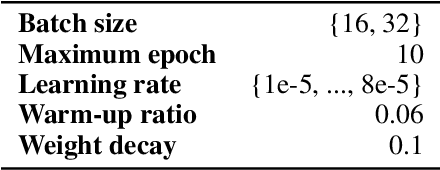MC-BERT: Efficient Language Pre-Training via a Meta Controller
Paper and Code
Jun 16, 2020



Pre-trained contextual representations (e.g., BERT) have become the foundation to achieve state-of-the-art results on many NLP tasks. However, large-scale pre-training is computationally expensive. ELECTRA, an early attempt to accelerate pre-training, trains a discriminative model that predicts whether each input token was replaced by a generator. Our studies reveal that ELECTRA's success is mainly due to its reduced complexity of the pre-training task: the binary classification (replaced token detection) is more efficient to learn than the generation task (masked language modeling). However, such a simplified task is less semantically informative. To achieve better efficiency and effectiveness, we propose a novel meta-learning framework, MC-BERT. The pre-training task is a multi-choice cloze test with a reject option, where a meta controller network provides training input and candidates. Results over GLUE natural language understanding benchmark demonstrate that our proposed method is both efficient and effective: it outperforms baselines on GLUE semantic tasks given the same computational budget.
 Add to Chrome
Add to Chrome Add to Firefox
Add to Firefox Add to Edge
Add to Edge